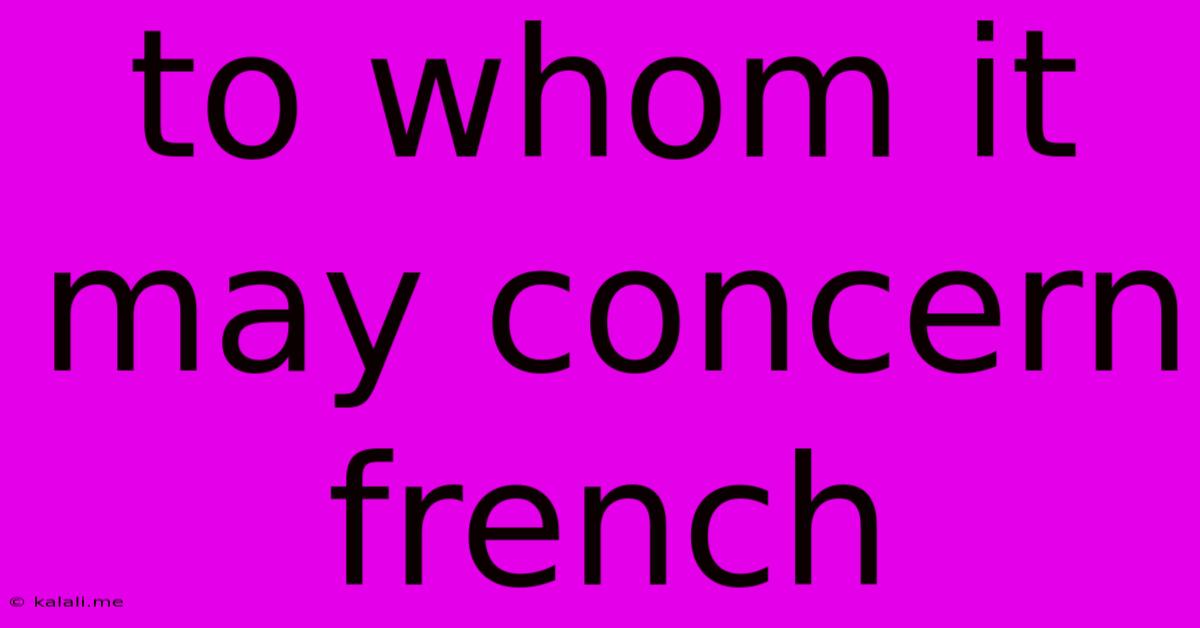To Whom It May Concern French
Kalali
Jun 01, 2025 · 3 min read

Table of Contents
To Whom It May Concern: A Comprehensive Guide to the French Equivalent and Alternatives
Finding the right way to address a recipient when you don't know their name is a common challenge in any language. In English, we use "To Whom It May Concern," a somewhat formal and impersonal salutation. But what's the equivalent in French, and are there better alternatives depending on the context? This article will explore the nuances of addressing correspondence in French when the recipient's name is unknown, providing you with the best options for various situations.
Why a Direct Translation Isn't Always Best: A literal translation of "To Whom It May Concern" into French, such as "À qui de droit," might seem like the obvious choice. However, it's considered quite formal and even slightly outdated in many contexts. While grammatically correct, it can sound stiff and impersonal, potentially diminishing the impact of your communication.
Understanding the Context: Choosing the Right Salutation
The best approach depends heavily on the context. Consider these factors:
- Formality: Are you writing to a government agency, a large corporation, or a smaller, more informal business?
- Relationship (or lack thereof): Do you have any prior contact with the organization or individual you're addressing?
- Purpose of Communication: Is it a formal complaint, a job application, or a simple inquiry?
French Alternatives to "À qui de droit"
Here are some more natural and effective alternatives to the somewhat archaic "À qui de droit," categorized by level of formality:
Formal:
- Madame, Monsieur: This is a perfectly acceptable and widely used option for formal letters and emails, regardless of whether you know the gender of the recipient. It's polite, respectful, and universally understood.
- À la direction: Meaning "To the management," this is suitable when addressing a company or organization. It's more specific than "Madame, Monsieur" and indicates that your message is intended for someone in a position of authority.
Semi-Formal:
- Bonjour: A simple "hello" works well for emails or shorter communications, especially in less formal settings. While not explicitly addressing anyone by name, it's polite and avoids the stiffness of "À qui de droit."
Informal (Use with caution):
Using an informal salutation when writing to an unknown recipient is generally discouraged, as it can appear unprofessional. Avoid overly casual greetings in business correspondence.
When "À qui de droit" Might Be Appropriate
While generally avoidable, there are a few scenarios where "À qui de droit" might still be suitable:
- Highly formal legal documents: In these specific situations, its traditional usage might be more appropriate.
- When other options are inappropriate: If you are uncertain about the gender of the recipient and all other options seem inadequate.
However, even in these instances, consider whether a more modern approach might be equally effective and less archaic.
Improving Your Communication: Beyond the Salutation
Remember, the salutation is just the beginning. The overall tone, clarity, and professionalism of your communication are equally important. Proofreading carefully and maintaining a respectful tone will enhance your message regardless of the salutation you choose.
In conclusion, while "À qui de droit" exists, it's not always the best choice. By considering the context and selecting a more appropriate salutation from the alternatives discussed above, you can ensure your French communication is both effective and respectful. This will ultimately make a better impression and increase your chances of a positive response.
Latest Posts
Latest Posts
-
How To Find Vertical Asymptotes Of Limits
Jun 03, 2025
-
Abs Brakes Kick In At Low Speeds
Jun 03, 2025
-
What Does It Mean To Purse Your Lips
Jun 03, 2025
-
Can A Window Ac Be Installed In A Wall
Jun 03, 2025
-
Linear Combination Of Normal Random Variables
Jun 03, 2025
Related Post
Thank you for visiting our website which covers about To Whom It May Concern French . We hope the information provided has been useful to you. Feel free to contact us if you have any questions or need further assistance. See you next time and don't miss to bookmark.